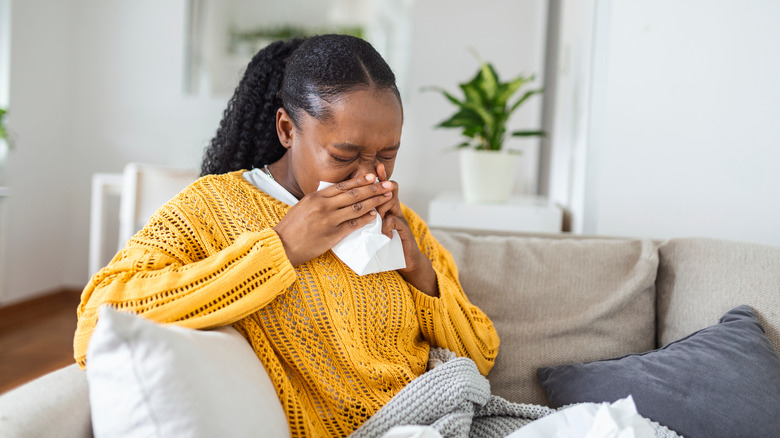The Link Between Allergies And Cancer Explained
Your body's immune system is pretty powerful in fighting off infection and anything foreign that doesn't need to be there. Sometimes your immune system mistakes something like pollen, pet dander, or dust to be harmful, so it sends antibodies called immunoglobulin E (IgE) to fight this substance, according to Johns Hopkins Medicine. IgE antibodies bind to allergens and release histamine, which produces an allergic reaction such as congestion, coughing, or sneezing (via American Academy of Allergy, Asthma, & Immunology). Every time you're exposed to a particular allergen, your body will continue producing these IgE antibodies. According to the Asthma and Allergy Foundation of America, allergies plague about 100 million people every year in the United States and rank sixth in leading causes of chronic illness.
When your immune system is used to fighting off allergens, could it better prepare you to battle cancer? Or does your body become worn out from continually resisting allergens to the extent it can't fight it? Research shows some pretty interesting findings about the link between allergies and cancer.
Allergies and cancer risks are site-specific
A 2007 systematic review in Annals of Allergy, Asthma & Immunology looked at how allergies are associated with cancer in different parts of the body. If you suffer from allergies, you're less likely than the rest of the population to suffer from cancers in specific places such as the throat, colon, pancreas, and stomach. However, allergy sufferers have a higher risk of bladder or prostate cancer, lymphoma, or myeloma.
According to a 2008 article in The Quarterly Review of Biology, the link between allergies and cancer was mixed in that some studies found allergies were associated with a higher risk and some with a lower risk of cancer. As a whole, twice the number of studies in this literature search showed that an allergy reduced risk rather than increased the risk of a specific type of cancer. People with allergies have a lower risk of cancers that involve tissues and organs that are subjected to the external environment than those that involve more internal organs. Specifically, people with eczema, hives, and allergies to dander and food have a lower risk of cancer in the more external organs. The researchers concluded that it's possibly the release of the IgE antibodies that could have protective effects against cancer.
Allergies and invasive cancers
A 2019 study in Cancer Epidemiology, Biomarkers & Prevention suggested that the continual stimulation of the immune system from allergies could protect some people from more invasive types of cancer. The researchers followed 64,000 people for an average of six years to investigate this link. Some people had a history of being treated for allergies or asthma, and some people did not. The study found that allergies or asthma weren't associated with a risk of invasive cancer overall. However, people with allergies had a 20% lower risk of lung cancer, and people with asthma had a 25% increased risk for lung cancer.
A 2016 study in Allergy, Asthma & Clinical Immunology compared more than 1,500 cancer patients with a non-cancer control group on their incidences of allergies. People with cancer had lower incidences of allergies and lower concentrations of the IgE antibodies.
According to a 2013 study in the American Journal of Hematology, women might be at a higher risk for blood cancer if they're allergic to airborne allergens such as plants, grass, and trees. The researchers believed that hormones could affect the immune system's ability to fight off cancer, but more research is needed.



